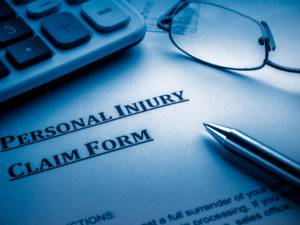In Florida, local law enforcement and the Federal Motor Carrier Safety Administration (FMCSA) are allowed to investigate accidents involving commercial trucks.
The FMCSA’s goal is to ensure that all trucks are safe and that trucking companies follow all laws.
Who Investigates Commercial Truck Accidents in Florida?
In Florida, when a commercial truck accident occurs, both local law enforcement and the Federal Motor Carrier Safety Administration (FMSCA) can investigate the incident. The FMSCA has the right to investigate all truck accidents on both state and federal levels.
Need free legal help in Florida?
We specialize in personal injury claims.

What Are the Federal Regulations in Florida?
Florida has federal regulations pertaining to the trucking industry that dictate what’s allowed and what’s prohibited for commercial trucks and trucking companies. The state places restrictions on lanes that trucks are permitted to travel on; commercial trucks cannot travel on left or inside lanes on certain roads.
The state’s federal regulations also determine the maximum height, width and length for commercial trucks and trailers. Hours of service are also explained for truck drivers who travel on an intrastate basis. This is to ensure that truckers are less likely to work while fatigued to reduce the risk of truck accidents.
Other Florida regulations surrounding commercial trucks include transporting hazardous substances, truck maintenance, drug and alcohol testing and trucker qualifications.
How Federal Regulations Affect Florida Truck Accident Lawsuits
All drivers, including truckers, are required to adhere to the rules of the road in Florida and anywhere else. Naturally, things sometimes go wrong and accidents occur, leaving people injured or even killed. In the case of the trucking industry, the rules and regulations are especially strict due to the massive size and weight of commercial trucks. If any of the regulations set forth by the FMCSA are violated, it can have devastating results.
When a person has suffered injuries or someone has been killed as a result of a commercial truck accident, they or their loved ones may want to file a truck accident lawsuit. If the evidence shows that FMCSA regulations were violated, different steps can occur. The FMCSA can get involved and it can conduct various types of investigations to determine the facts of the case.
What Is the Federal Motor Carrier Safety Administration (FMCSA)?
The Federal Motor Carrier Safety Administration (FMCSA) is a federal government agency that is responsible for regulating the commercial trucking industry to ensure that all trucks are safely maintained. It also provides rules and regulations for all other commercial vehicles, buses and individuals who hold commercial driver’s licenses. The goal of the FMCSA is to reduce the number of accidents, injuries and deaths involving commercial trucks and other commercial vehicles.
Understanding FMCSA Regulations for Investigating Accidents
When the FMCSA investigates a truck accident, it will first send a representative to the trucking company to conduct an interview. This is to gather information about how the company operates and how trips and planned, carried out and overseen and how trucks are monitored during their travels. The representative may also want to interview other staff who work in the payroll and accounts receivable departments and truck drivers to ensure that everyone says the same things.
During accident investigations, the FMCSA also requests copies of reports from the trucking company’s electronic logging device (ELD). This provides data about potential violations such as speeding, erratic driving, driving outside of working hours and more.
What Types of Investigations Does the FMCSA Conduct?
There are three types of investigations the FMCSA may conduct to determine how a truck accident occurred. An offsite investigation entails reviewing paperwork from the trucking company to determine whether there are any red flags about performance or compliance.
An onsite investigation, also known as a DOT inspection, is conducted when an inspector looks over a trucking company’s entire operations. During a DOT inspection, they will conduct interviews with staff, review important records, and inspect trucks for any safety issues.
The third type of FMCSA investigation is the onsite-focused one. This involves an inspection of several trucks and interviews with staff while focusing on s specific issue. It doesn’t entail reviewing the trucking company’s operations.
Why it Matters if FMCSA Rules Are Violated
In Florida, it matters if a truck driver or trucking company or both have violated an FMCSA rule. If this is the case, the trucker or the company is given certain penalties. This can include fines or even stricter measures such as criminal prosecution.
Need free legal help in Florida?
We specialize in personal injury claims.

The Role of Experts in Truck Accident Investigations
If any of the facts of a truck accident are unclear, an expert visits the scene to gather physical evidence, take photos and document anything relevant they notice. Generally, this is accident reconstruction, which is necessary when it’s not 100% certain how the accident occurred or what caused it.
What Is Negligence Per Se?
In a truck accident, negligence per se means that the truck driver or trucking company has violated an FMCSA regulation, therefore, breaching their duty of care to operate safely. The phrase means “negligence” as a whole.
Role of Trucking Companies
The role of a trucking company is to conduct business involving the transport of merchandise, freight, materials or other items. Trucking companies carry goods for others to get them from one place to another.
What State Agencies Can Investigate Florida Commercial Vehicle Accidents?
Certain state agencies can be involved when a Florida commercial vehicle accident needs to be investigated. They include the Florida Highway Patrol (FHP), the Department of Transportation (DOT) and local law enforcement agencies.
Florida Highway Patrol’s Involvement
The Florida Highway Patrol (FHP) investigates truck accidents and other accidents that occurred on the state’s roads. The FHP doesn’t typically work in cities and relies on calls from eyewitnesses notifying it of accidents.
Department of Transportation (DOT) Investigations
The Department of Transportation (DOT) sometimes investigates truck accidents as well. As the FMCSA is a division of the DOT, the DOT has the authority to conduct an investigation when further depth is needed to understand the facts behind a truck accident.
Local Law Enforcement’s Involvement
Local law enforcement can investigate truck accidents that occur in their jurisdictions. Usually, they are the first point of getting to the bottom of these accidents, and larger agencies like the FMCSA can then take over.
What Factors Are Considered When an Investigating Agency is Assigned in Florida?
There are two main factors considered when an investigative agency is assigned in Florida to investigate a truck accident. They include jurisdictional issues and the type of accident and injury severity.
What Jurisdictional Issues May Arise?
Depending on the area where a truck accident occurs, some agencies may not be able to investigate the matter. Jurisdictional issues can also arise if the victim lives in another state but suffered injuries in Florida.
Understanding Accident Type and Injury Severity and the Investigative Agency
Certain investigative agencies may be called in to investigate a truck accident based on the type of accident and the severity of the injuries suffered by the victim or victims.
How Does the Investigative Process Work in Florida?
In Florida, there are several steps involved in the investigative process. They include the emergency response, gathering information, commercial vehicle inspection, data retrieval, driver records, preservation of evidence, accident reconstruction, witness statements, reviewing trucking company policies, insurance company investigations, determining fault and legal proceedings.
About the Emergency Response
First, emergency responders have to arrive at the scene of a truck accident. Typically, this includes the police and emergency medical personnel in an ambulance to assist anyone who has suffered injuries.
Information Gathering for Investigations
When police come to the scene of a truck accident at the initial stage of an investigation, they make accident reports detailing what happened. However, other options for information gathering may be more intensive such as when an investigator comes to the scene. Word-of-mouth from parties involved in the accident and witness accounts aid in providing an understanding of the events.
Inspection of Commercial Vehicles Involved in Accidents
The commercial truck or other commercial vehicle involved in an accident is also inspected to determine whether any factors may have led to the accident.
Understanding Data Retrieval in Commercial Truck Accidents
To determine the events in a commercial truck accident, investigators can review data found in the trucking company’s electronic logging device (ELD). The data can show any issues with the trucker’s driving, if there was a problem with the truck or anything else.
Driver Records for Investigations
Driver records can show investigators where the truck driver traveled and activities they took while working. However, even more importantly, driver records can show whether a trucker committed any traffic violations that may have caused or contributed to the accident. They can also reveal whether the truck driver has prior offenses, including criminal ones that would pose a higher risk of truck accidents.
Importance of Preservation of Evidence
Preserving the evidence in a truck accident is essential. It shows exactly what happened leading to the collision and who was most likely at fault. Evidence can include statements from the parties involved in the accident, witness accounts, photos of the accident scene and vehicles and any possible issues with the truck.
How Accident Reconstruction Helps
When the facts of how a truck accident occurred are uncertain, an investigative team can reconstruct the accident to determine that information. Accident reconstruction can make both the how and why it happened clearer.
The Importance of Witness Statements
Witness statements can provide vital proof of the events during a truck accident and who was at fault. Witnesses can also be called in later to testify if an injured victim or the family of a person killed due to the accident chooses to file a lawsuit.
How Trucking Company Policies Factor In
Trucking companies are required to follow all rules and regulations set forth by the FMCSA. During an investigation on a truck accident, the investigator can review the trucking company’s policies to see if it adheres to the law. If there are notable violations, the company can face penalties. In some cases, a truck accident occurs because of the company’s policies. For example, pushing truck drivers to work well beyond their shift without rest to reach a certain quota can lead to an uptick in accidents.
Investigations By the Insurance Company
Truck accidents are often complex, so they might require further investigation by an insurance company. If a truck accident claim goes through the trucking company’s insurer, the insurance company will want to know why the accident occurred in the first place. This is because insurers typically want to avoid paying especially if there is any question about who is at fault. With a thorough investigation where an injured party seeks damages, it wants as much information as possible and know how the accident happened.
Fault Determination
Determining fault is crucial in a truck accident case. If someone is injured or killed in such an accident, it must be known which party or parties to hold accountable. In some cases, investigations may determine that the truck driver, trucking company, cargo loader or manufacturer is at fault for an accident.
Understanding Legal Proceedings After a Truck Accident
If an investigation determines that a truck accident occurred as a result of negligence on the part of the truck driver or trucking company, a person injured or the personal representative of a person killed as a result is able to file a lawsuit to recover damages. Depending on the circumstances of the case, truck accident lawsuits may be filed on the premise of personal injury or wrongful death.
What Are the Causes of Truck Accidents in Florida?
Florida truck accidents can be caused by different factors. The most common include the actions of the truck driver, the negligence of the trucking company, errors in shipping and transit and defective truck and trailer parts.
Accidents Caused By the Actions of the Truck Driver
Truck accidents are often caused by the actions of the truck driver. Truckers can cause accidents if they are under the influence of alcohol or drugs, fatigued due to working overly long hours without rest or when ill and taking certain medications or due to reckless driving. Speeding, distracted driving and other types of driver error can also lead to a truck accident.
Negligence on the Part of a Trucking Company
Trucking companies are responsible for ensuring that all trucks are well-maintained so that they can safely travel across Florida roads and beyond. It must also properly and thoroughly train its drivers to ensure that they can safely and responsibly handle the huge vehicles and any cargo they’re required to transport. If a trucking company is negligent in any way and an accident occurs, it can be held liable for injuries, fatalities and any damages.
Accidents Caused By Errors in Shipping and Transit
Errors in shipping and transit can also cause truck accidents. This may be the fault of the cargo loader or the party responsible for shipping. All cargo must be properly loaded and the truck within the appropriate weight limit before it sets out on a trip. If this is not the case, a rollover accident can occur or cargo can come loose and spill out on the road, causing destruction.
Accidents Caused By Defective Truck and Trailer Parts
If a truck accident occurs because of defective truck or trailer parts, the truck’s manufacturer can be held liable. Every component of a commercial truck must be in good working condition and properly designed to prevent a potential disaster from happening.
What Sets Truck Accidents Apart from Other Accidents?
Truck accidents are different from accidents involving other motor vehicles for a few reasons: commercial trucks are much bigger and heavier, so an accident can cause even more severe effects. Trucks also frequently tote large, heavy items or hazardous materials or substances, adding to the devastation of a potential accident.
What Are the Types of Injuries Seen in Florida Truck Accident Claims?
Many of the injuries stemming from Florida truck accident claims are catastrophic in nature. They often include whiplash and neck injuries, traumatic brain injuries (TBIs), spinal cord injuries, broken bones and fractures, internal organ injuries, amputations, burns, crush injuries, emotional and psychological trauma, soft tissue injuries, facial injuries and death.
Whiplash and Neck Injuries from Truck Accidents
The impact of a truck accident can lead to whiplash or serious neck injuries. This happens when the head and neck violently jerk forward and back while the torso remains in place.
TBIs from Truck Accidents
A victim can develop a TBI when their head receives a severe blow or jolt. It can also occur when an object penetrates the skull and pierces the brain. Both of these scenarios can easily occur during a truck accident because of the sheer devastation of it. These injuries can range from mild to moderate or severe and end up being permanent or only temporary.
Spinal Cord Injuries from Truck Accidents
Spinal cord injuries can occur in truck accidents when a person suffers trauma to the spine. This can affect the delicate vertebrae in the neck or back and vary in severity depending on the impact. Spinal cord injuries can be mild to severe and temporary or permanent.
Broken Bones and Fractures from Truck Accidents
Broken bones and fractures are among the most common truck accident injuries. Depending on the type of accident and the impact the victim suffers, they can be left with a simple or compound fracture.
Internal Organ Injuries from Truck Accidents
Truck accidents can leave victims suffering from internal organ injuries due to high impact. These injuries often occur when a person’s body makes violent contact with the steering wheel, dashboard, seatbelt or airbag. They are catastrophic in nature, need immediate medical attention and may require surgery.
Amputations from Truck Accidents
Amputations can occur in truck accidents when a limb suffers a crushing injury. This can also happen if a person’s limb is severed due to the impact of the accident, leaving them permanently disabled.
Burns from Truck Accidents
If a truck carrying flammable or explosive materials gets into an accident, it can result in severe burn injuries. These are highly catastrophic and often require multiple skin graft surgeries to repair. Many people who suffer burn injuries face lifelong medical treatment and long recovery periods.
Crush Injuries from Truck Accidents
A body part can be crushed in a truck accident. In some cases, more than one part of the body can be impacted. These injuries are devastating and can significantly change a person’s life.
Emotional and Psychological Trauma from Truck Accidents
Truck accidents are traumatic even if a person escapes physically unscathed. They can be left with emotional and psychological trauma for years and battle anxiety, depression or post-traumatic stress disorder (PTSD). A person left with these injuries often needs extensive therapy and even medication to treat their symptoms. They may not be able to resume normal daily life.
Soft Tissue Injuries from Truck Accidents
Soft tissue injuries from truck accidents occur when the delicate tendons, muscles, ligaments and tissue suffer tears. Victims can be left with pain, swelling and limited range of motion. In some cases, surgery might be necessary to repair the damage.
Facial Injuries from Truck Accidents
If a person suffers impact directly to their face during a truck accident, they can be left with facial injuries. This can include scarring or disfigurement. Plastic surgery may be needed, depending on the severity of the injury.
Wrongful Death from Truck Accidents
Wrongful death is common after a truck accident. A person can be killed, leaving loved ones behind to suffer from their tremendous loss. The victim’s personal representative can file a wrongful death claim on behalf of the surviving family members.
Frequently Asked Questions
What Are the DOT Regulations for Trucking in Florida?
In Florida, all trucks must display a valid U.S. DOT number or state registration number. They must also display a Department of Highway Safety and Motor Vehicles fuel decal if they weigh over 26,001 pounds or if a truck has more than three axles.
Can You File a Police Report After an Accident in Florida?
Florida law requires the police to be called after any accident involving injuries or significant property damage. When the police arrive, you can file a police report about the accident.
Do You Have to Report an Accident in Florida?
You have to report an accident in Florida if a person has been injured or killed.
What Is the Penalty for Leaving the Scene of an Accident in Florida?
In Florida, the penalty for leaving the scene of an accident is a hit-and-run charge, which is a felony.
What Is Considered a Commercial Vehicle in Florida DOT?
Florida considers vehicles with a weight of at least 26,001 pounds or three axles, regardless of weight, or that are used with a trailer to be commercial vehicles.
What Are DOT Requirements in Florida?
Florida DOT requires vehicles used for business on a commercial basis to be registered for a Florida DOT number.
What Happens if the Person at Fault in an Accident Has No Insurance in Florida?
If a person in Florida is at fault for an accident and has no insurance, the victim can go through their own insurance coverage or file a lawsuit directly against them.
What Size Truck Requires a CDL in Florida?
Trucks with a weight of 26,001 pounds or greater require a CDL driver operating them.
How Many Hours Can a Truck Driver Drive in Florida?
In Florida, a truck driver is permitted to drive no more than 11 hours after at least 10 hours off-duty or after 70/80 hours in seven or eight consecutive days.
What Is the DOT Height Limit in Florida?
Florida’s DOT height limit is 13 feet, 6 inches.
How Much Is a DOT License in Florida?
A commercial DOT license costs $75 in Florida.
What Is the No-Fault Law in Florida?
Florida’s no-fault law for motor vehicle accidents requires all drivers to use their own auto insurance policy to cover the costs of damages. All drivers must carry at least $10,000 in personal injury protection (PIP) coverage and $10,000 in property damage liability (PDL) coverage.
How Do I Register a Commercial Vehicle in Florida?
To register a commercial vehicle in Florida, you must have an established business based in the state that requires commercial truck operations with mileage throughout the state. Your fleet records must be maintained within Florida and available there. Finally, you must also operate in at least one additional International Fuel Tax Agreement (IFTA) jurisdiction.
Need free legal help in Florida?
We specialize in personal injury claims.






